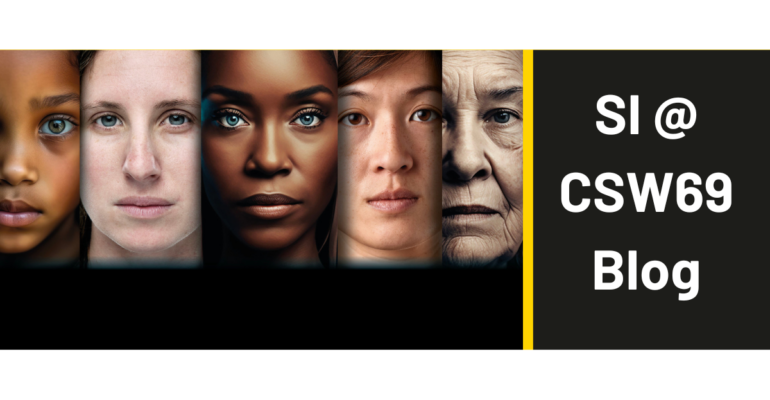Blog by Cherrie Power – SI Shepparton and SI Melbourne
I was able to attend The Beijing Platform For Action and Women’s Peacebuilding Leadership parallel event. This event was hosted by the Kroc Institute for Peace and Justice, at the University of San Diego, in collaboration with the NGO CSW Forum and the 2025 Commission on the Status of Women (CSW69).
The focus was on celebrating the 30th anniversary of the Beijing Declaration and Platform for Action, the comprehensive global agenda for gender equality established in 1995.
This event featured four amazing women peacebuilders, discussing the impact of the Beijing Platform on their work and the future steps for gender equality and peacebuilding.
The panellists included Ms. Olenka Ochoa-Beretiaga, Immaculate Anne Mukasa, Dr. Rubina Feroz-Bati, and Ms. Jane Anyonga Odongo.
The women highlighted the importance of the Beijing Declaration in shaping their peacebuilding efforts and promoting women’s rights, with a focus on intergenerational learning, policy advocacy, and addressing specific issues including legal marriage age and interfaith peacebuilding.
Olenka Ochoa-Beretiaga is from Peru. Ms. Ochoa-Beretiaga is a former elected official at the Metropolitan City Hall of Lima, the former General Director of the Ministry of Women and a graduate in Development, Risk Reduction, Disaster, Women and Gender.
Ms. Ochoa-Beretiaga spoke about her experience of being at the Commission on the Status of Women in 1995, when the Beijing Declaration and Platform for Action was adopted. She said that connecting with other women who shared her passion for human rights was particularly meaningful as a young activist. She believes this moment was the golden age for women’s rights.
Women’s Rights are Human Rights
Immaculate Anne Mukasa is from Uganda and is a member of the Women Waging Peace Network, the Global Peace Network and the International Network to End Violence Against Women. Ms Mukasa is also the Executive Director of the Mentoring and Empowerment Program for Young Women
Ms. Mukasa spoke about Uganda’s National Action Plan which was informed by the Beijing Declaration and how this Action Plan has been instrumental in involving women in peace building efforts. Uganda has experienced its share of conflicts since achieving independence in 1962. Thanks to the National Action Plan, Uganda now only has sporadic small pockets of conflict, much of which occurs within the home and families.
Ms. Mukasa listed the four outcomes of the National Action Plan:
- Eliminating all forms of violence.
- Contributing to good governance and natural resource and human resource.
- Prevention of disasters and human related or mitigating climate injustice or natural disasters.
- Supporting the systems and structures to implement the National Action Plan itself.
Ms Mukasa and the Mentoring and Empowerment Programme for Young Women are focusing on helping women to recognise violence, understand peace, address and prevent violence and access support.
Dr. Rubina Feroz-Bati is currently the General Secretary of the Pakistan Partnership Initiative which is a network of 80 faith-based organisations in Islamabad which is committed to holistic national development.
Dr. Rubina confidently said that the world is more equal for women and girls than before. Although progress remains slow and uneven across the globe. Despite the uneven global progress, the Beijing Declaration and Platform for Action has been a powerful tool in protecting the rights of women and girls from minority groups and is helping to build interfaith harmony and peace building.
Dr. Rubina discussed how she worked on the Christian Marriage Act of 1872 and was able to raise the legal marriage age from 13 to 18 years old for girls and from 16 to 18 years old for boys, thus protecting the rights of the girls.
This Act is also protecting their rights to education, their health and their right for personal growth.
Ms. Odongo is from Kenya and is a Grassroots Women’s Rights Activist who has dedicated her life to promoting peaceful elections and fostering reconciliation through her community.
Ms. Odongo spoke about the ability to advocate and influence policies at national, regional and global levels. She also outlined how women can network and bring each other together, to empower women and girls, fight for their rights and leave no one behind.
Concluding Thoughts
All four panellists emphasised the need for continued advocacy, resource investment, and inclusion of youth and women in leadership roles to further advance gender equality and peacebuilding efforts.
For me, this discussion reiterated that the Beijing Declaration and Platform for Action remains a vital framework for advancing gender equality and peacebuilding. It also highlighted the global need for continued collaboration, resource allocation, and inclusion of diverse voices to address ongoing challenges and shape the future of women’s rights and peace efforts is still fundamental.

